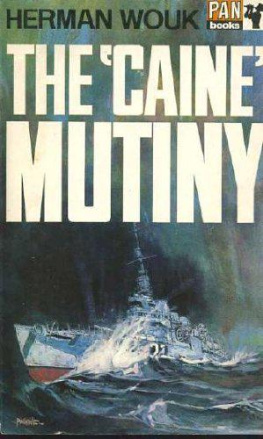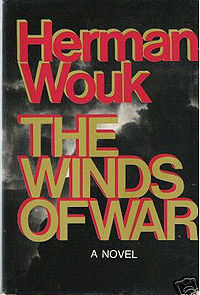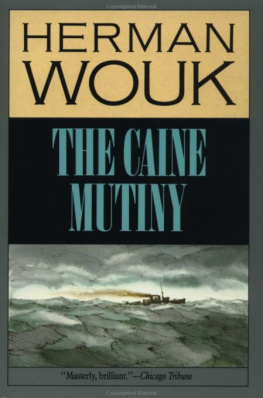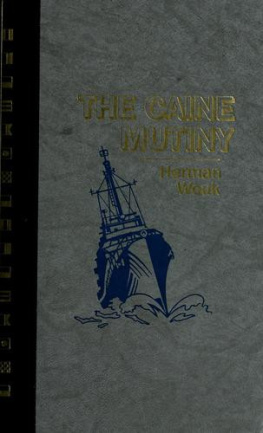Herman Wouk - The Caine Mutiny
Here you can read online Herman Wouk - The Caine Mutiny full text of the book (entire story) in english for free. Download pdf and epub, get meaning, cover and reviews about this ebook. year: 1954, publisher: Doubleday, genre: Detective and thriller. Description of the work, (preface) as well as reviews are available. Best literature library LitArk.com created for fans of good reading and offers a wide selection of genres:
Romance novel
Science fiction
Adventure
Detective
Science
History
Home and family
Prose
Art
Politics
Computer
Non-fiction
Religion
Business
Children
Humor
Choose a favorite category and find really read worthwhile books. Enjoy immersion in the world of imagination, feel the emotions of the characters or learn something new for yourself, make an fascinating discovery.
- Book:The Caine Mutiny
- Author:
- Publisher:Doubleday
- Genre:
- Year:1954
- Rating:5 / 5
- Favourites:Add to favourites
- Your mark:
- 100
- 1
- 2
- 3
- 4
- 5
The Caine Mutiny: summary, description and annotation
We offer to read an annotation, description, summary or preface (depends on what the author of the book "The Caine Mutiny" wrote himself). If you haven't found the necessary information about the book — write in the comments, we will try to find it.
The Caine Mutiny — read online for free the complete book (whole text) full work
Below is the text of the book, divided by pages. System saving the place of the last page read, allows you to conveniently read the book "The Caine Mutiny" online for free, without having to search again every time where you left off. Put a bookmark, and you can go to the page where you finished reading at any time.
Font size:
Interval:
Bookmark:
THE CAINE MUTINY
BY HERMAN WOUK
Novels
The Caine Mutiny
The City Boy
Aurora Dawn
Plays
The Caine Mutiny Court-Martial
The Traitor
The Caine Mutiny
A NOVEL OF WORLD WAR II
by Herman Wouk
ILLUSTRATED WITH PHOTOGRAPHS
Doubleday & Company, Inc., Garden City, New York, 1954
NOTE: This is a work of fiction in the historical setting of World War II. It contains errors of fact. Times and places of specific circumstances in actual military operations, names and missions of ships, and naval communication procedures have been distorted either to suit the story or to avoid inadvertent recounting of still classified information. All the persons and events aboard the Caine are imaginary. Any resemblance to actual persons or events is coincidental. No ship named U.S.S. Caine exists or existed. The records of thirty years show no instance of a court-martial resulting from the relief of a captain at sea under Article 184, 185, and 186 of the Naval Regulations. The fictitious figure of the deposed captain was contrived from a study of psychoneurotic case histories to motivate the central situation and is not a portrait of a real military person or a type. This statement is made in view of an existing tendency to seek lampoons of living people in fiction. The author served under two captains of the regular Navy in three years aboard destroyer-minesweepers, both of whom were decorated for valor. One comment on style: The general obscenity and blasphemy of shipboard talk have gone almost wholly unrecorded. This good-humored billingsgate is largely monotonous and not significant, mere verbal punctuation of a sort, and its appearance in print annoys some readers. The traces that remain are necessary where occurring.
Copyright, 1951, by Herman Wouk
All Rights Reserved
Printed in the United States
All photographs of the play are by Gene Howard-Hollywood. Photographs facing pages 39 and 318 are by Columbia Pictures Corporation. All other photographs are by Dennis Stock-Magnum Photos, Inc.
This tale is for my wife,
with all my love

From the Navy Regulations;
Article 184.
UNUSUAL CIRCUMSTANCES.
It is conceivable that most unusual and extraordinary circumstances may arise in which the relief from duty of a commanding officer by a subordinate becomes necessary, either by placing him under arrest or on the sick list; but such action shall never be taken without the approval of the Navy Department or other appropriate higher authority, except when reference to such higher authority is undoubtedly impracticable because of the delay involved or for other clearly obvious reason. Such reference must set forth all facts in the case, and the reasons for the recommendation, with particular regard to the degree of urgency involved.
Article 185.
CONDITIONS TO FULFILL.
In order that a subordinate officer, acting upon his own initiative, may be vindicated for relieving a commanding officer from duty, the situation must be obvious and clear, and must admit of the single conclusion that the retention of command by such commanding officer will seriously and irretrievably prejudice the public interests. The subordinate officer so acting must be next in lawful succession to command; must be unable to refer the matter to a common superior for one of the reasons set down in Article 184; must be certain that the prejudicial actions of his commanding officer are not caused by secret instructions unknown to the subordinate; must have given the matter such careful consideration, and must have made such exhaustive investigation of all the circumstances, as may be practicable; and finally must be thoroughly convinced that the conclusion to relieve his commanding officer is one which a reasonable, prudent, and experienced officer would regard as a necessary consequence from the facts thus determined to exist.
Article 186.
RESPONSIBILITY.
Intelligently fearless initiative is an important trait of military character, and it is not the purpose to discourage its employment in cases of this nature. However, as the action of relieving a superior from command involves most serious possibilities, a decision so to do or so to recommend should be based upon facts established by substantial evidence, and upon the official views of others in a position to form valuable opinions, particularly of a technical character. An officer relieving his commanding officer or recommending such action, together with all others who so counsel, must bear the legitimate responsibility for, and must be prepared to justify, such action.
It was not a mutiny in the old-time sense, of course, with flashing of cutlasses, a captain in chains, and desperate sailors turning outlaws. After all, it happened in 1944 in the United States Navy. But the court of inquiry recommended trial for mutiny, and the episode became known as the Caine mutiny throughout the service.
The story begins with Willie Keith because the event turned on his personality as the massive door of a vault turns on a small jewel bearing.
PART ONE
WILLIE KEITH
CHAPTER 1
Through the Looking Glass
He was of medium height, somewhat chubby, and good looking, with curly red hair and an innocent, gay face, more remarkable for a humorous air about the eyes and large mouth than for any strength of chin or nobility of nose. He had graduated from Princeton in 1941 with high marks in all subjects except mathematics and sciences. His academic specialty had been comparative literature. But his real career at Princeton had consisted of playing the piano and inventing bright little songs for parties and shows.
He kissed his mother good-by on the sidewalk near the corner of Broadway and 116th Street in New York City, on a cold sunny morning in December 1942. The family Cadillac was parked beside them, its motor running, but maintaining a well-bred silence. Around them stood the dingy gray-and-red buildings of Columbia University.
Dont you think, said Mrs. Keith, smiling bravely, that we might stop in that drugstore first and have a sandwich?
She had driven her son to the midshipmen school from their home in Manhasset, despite Willies protests. Willie had wanted to take the train. It would have seemed more like departing for the wars; he did not like being escorted to the gates of the Navy by his mother. But Mrs. Keith had prevailed as usual. She was a large, wise, firm woman, as tall as her son, and well endowed with brow and jaw. This morning she was wearing a fur-trimmed brown cloth coat instead of mink, to match the austerity of the event. Beneath her mannish brown hat her hair showed the dominant red strain that had reappeared in her only child. Otherwise there was little resemblance between mother and son.
The Navyll feed me, Mom. Dont worry.
He kissed her for the second time and glanced nervously about, hoping that no military men were observing the over-tender scene. Mrs. Keith pressed his shoulder lovingly.
I know youll do wonderfully, Willie. Just as you always have.
Aye aye, Mother. Willie strode along the brick walk past the School of Journalism, and down a few steps to the entrance of Furnald Hall, formerly a dormitory for law students. A grizzled, pudgy Navy chief with four red service stripes on his blue coat stood in the doorway. Mimeographed papers in his hand flapped in the breeze. Willie wondered whether to salute, and swiftly decided that the gesture did not go well with a brown raglan coat and green pork-pie hat. He had completely forgotten his mother.
You V-7? The chiefs voice was like a shovelful of pebbles dropped on tin.
Font size:
Interval:
Bookmark:
Similar books «The Caine Mutiny»
Look at similar books to The Caine Mutiny. We have selected literature similar in name and meaning in the hope of providing readers with more options to find new, interesting, not yet read works.
Discussion, reviews of the book The Caine Mutiny and just readers' own opinions. Leave your comments, write what you think about the work, its meaning or the main characters. Specify what exactly you liked and what you didn't like, and why you think so.











